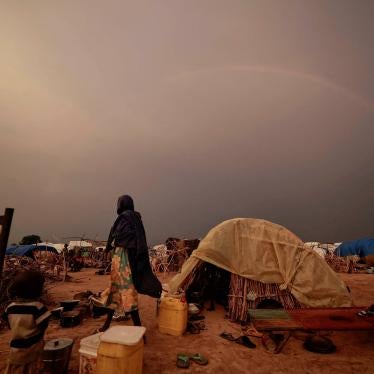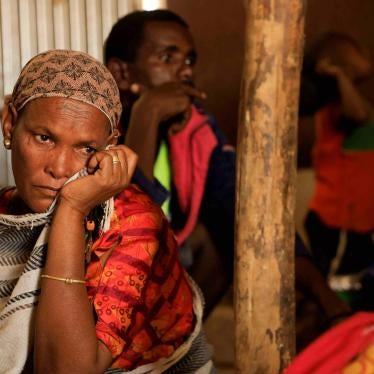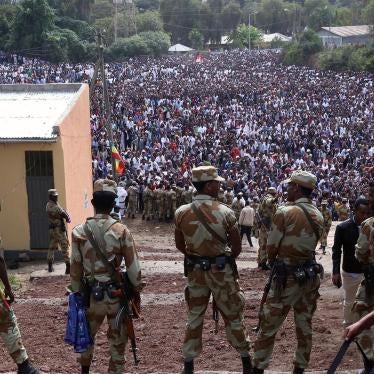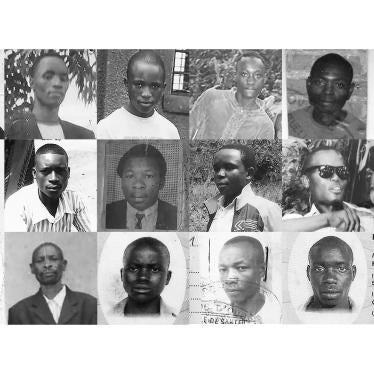H.E. Dr. Jean Ping
Chairperson, African Union Commission
Addis Ababa, Ethiopia
Your Excellency,
Human Rights Watch welcomes the initiative by the AU Commission to develop a human rights strategy in anticipation of the January 2011 Summit dedicated to the theme of "Shared Values." The African Union has consistently promoted such values as "respect for human rights," "democratic governance," and "accountability" as being among those shared across the continent. This is particularly important given the reality in many African countries of a huge gap between the "shared values" vision that the AU seeks to impress upon its members and the policies and practices often observed on the ground.
In this context, Human Rights Watch has some thoughts on concrete measures that the Commission might adopt in its human rights strategy that might help fill these gaps and help achieve the African Union's proclaimed vision of dignity and equality for all Africans over the longer term.
With this is mind, we would propose the following:
1. Strengthen implementation mechanisms of the African Charter on Human and Peoples' Rights
The African Union already has a strong human rights foundation in the African Charter on Human and Peoples' Rights. The AU might realize its vision of greater human rights protection by bolstering the role of the African Commission on Human and Peoples' Rights (ACHPR) and monitoring and implementing its findings. One option in this regard might be to commission regular, independent and public reports on member state compliance with the AU's guiding principles and key instruments of international human rights law.
The AU should help appoint dynamic commissioners to the ACHPR with experience of working in civil society organizations. And it might also increase the capacity of the Commission to publish timely mission reports on the most pressing human rights issues on the continent, as well as consider appointing an independent human rights adviser, reporting directly to the AU Chairman.
The AU's human rights strategy might usefully focus on the independence and effectiveness of the African Court on Human and Peoples' Rights. Notwithstanding ongoing debates aimed at reform, the Court was primarily conceived as a complementary means of redress for the victims of human rights violations in Africa, alongside existing mechanisms. However its profile has been undermined by a variety of challenges, including a perceived absence of political will to render it a stronger advocate for human rights. As a first step to counter this perception, the AU might enshrine the African Court at the heart of its human rights agenda by considering amending the Court's statute to grant citizens who are victims of human rights violations and civil society organizations the right of direct access to its jurisdiction.
2. Integrate Human Rights Concerns in the Work of the Peace and Security Council
Human Rights Watch firmly believes that peace and security are inextricably linked to the protection of human rights. Violations of human dignity and justice foster conflict; and failure to address those responsible for serious crimes in violation of international law weakens efforts at conflict resolution.
The decisions of the AU Peace and Security Council, more than any other body of the African Union, tend to reflect - and impact on - crucial human rights concerns. For the last few years, the Peace and Security Council has dealt with urgent political crises in Somalia, Sudan, Guinea and (now) Cote d'Ivoire, to name but a few. Disappointingly, it has not always factored core human rights dimensions of these crises into its policy response, as in Somalia. However, in cases such as Guinea, where human rights issues were noted as a core problem and early on factored into the AU's reaction, the AU deserved justified praise for its handling of that crisis, strengthening both its peace and security and human rights credentials at the same time. The Council might therefore integrate human rights into its work by permitting the prompt investigation and mapping of serious crimes that often accompany political instability in many African countries. Ultimately, the Council might also recommend appropriate accountability mechanisms and, in so doing, be seen to stand clearly in solidarity with the victims of serious human rights abuses. Such a function could be supported by a Council-designated human rights research and policy officer.
3. Articulate a Plan for Achieving Concrete Human Rights Objectives
The AU Commission should consider developing and implementing a plan to address key human rights objectives. These could be in the following areas:
- Civilian protection - A distinctive feature of the AU's mission is addressing the huge peace and security challenges facing the continent. In response to situations of armed conflict, the AU increasingly relies on its peacekeeping missions, which have an inherent responsibility for the protection of civilians. At the same time, we have not yet seen effective implementation of these obligations. There is an urgent need to clarify and tackle such civilian protection shortfalls.
- Political repression - In a number of African states, governments and ruling parties continue to use violence and intimidation against actual or supposed political opponents. Those often targeted include prominent members of the political opposition, independent journalists, and members of civil society organizations. The AU lacks strong and effective mechanisms to address this problem. It has always shown support for good governance initiatives and consistently denounced unconstitutional changes of government. However, millions of African citizens continue to face narrow democratic spaces in their countries, and cannot freely exercise their rights to freedom of expression, peaceful assembly, and association. The AU's strategy on human rights might therefore include specific programs that bolster (and make more independent) rights-related components of initiatives like the New Partnership for Africa's Development (NEPAD) and the African Peer Review Mechanism (APRM). These mechanisms arose from the firm recognition that upholding high standards of good governance, democracy and human rights is central to sustained, long-term economic development. The strategy might also outline institutional avenues - such as appointing independent ombudsmen - through which the victims of political repression could channel their grievances and have them acted upon without facing further threats.
- Accountability for serious violations of human rights -Impunity with regard to serious violations of human rights is a threat to Africa's future and calls for vigilance and robust responses in all cases. In principle, the AU has shown commendable commitment to justice in cases of genocide, war crimes, and crimes against humanity. But, as the case of Darfur has demonstrated, the message has sometimes been mixed, and concerns expressed that the pursuit of justice would interfere with efforts to restore peace and security in countries prone to armed conflict. While the short-term temptation to forgo accountability in an effort to attain peace and security is understandable, the high long-term cost of a culture of impunity is too often overlooked. We would like to see accountability for serious violations of human rights as a vital component of the AU's human rights agenda. Ideally, the AU might appoint a special department of its own for war crimes and crimes against humanity whose primary role would consist of advising the AU on the prevention and prosecution of such crimes.
- Sexual and Gender-Based Violence - The AU's human rights strategy might direct particular attention to efforts aimed at ending violence against women on the continent. Regional legal instruments prohibiting discrimination against women and gender-based violence already exist. But, at the same time, millions of African women continue to face various forms of serious abuse, in both war and peace. They face threats such as domestic violence, abuse in custody, harmful traditional practices such as female genital mutilation, sexual harassment at work, and rape as a weapon of war on a daily basis. As the AU has declared the Decade of the African Woman and has promoted programs to bolster maternal and child health, it might reinforce this campaign by including in its human rights strategy explicit mechanisms and programs that prevent and protect against such appalling violence.
Human Rights Watch firmly believes in the AU's potential to improve human rights across the continent. An initiative to develop a human rights strategy is, in itself, an indication that the AU is committed to finding effective ways of building upon the positive aspects of current African human rights institutions as well as on Africa's shared values, to cement a deeper human rights culture on the continent.
The test of that commitment, of course, will be implementing concrete, practical measures that match the ambitious rhetoric. We at Human Rights Watch stand ready to support such measures, pursue a regular dialogue with your colleagues to assist in any way we can to successfully implement your new strategy.
Sincerely,
Aloys Habimana
Deputy Director
Africa Division
Human Rights Watch
Cc: Salah Hammad, Head of the Human Rights Division, AU-DPA








